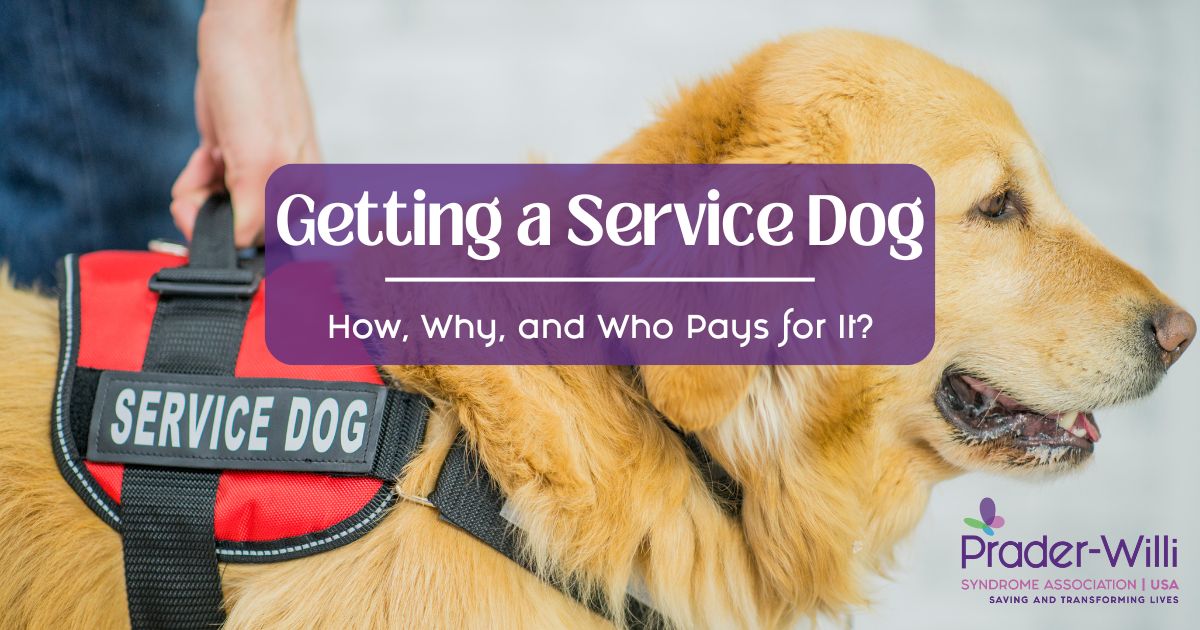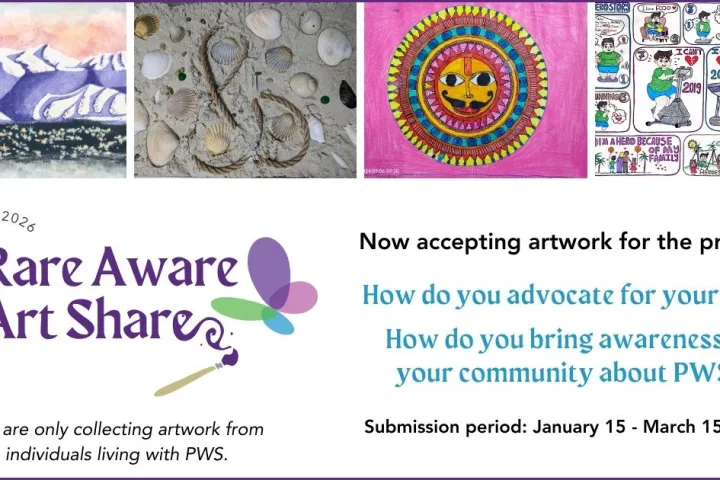In a few months, Pia Dorson and her family will be welcoming a service dog into their home. Their middle daughter, Zahra, is a 6-year-old living with PWS. While Zahra may be the catalyst for this family addition, Pia wanted to be sure that their other children would have access to this dog as well. “As a whole, it is an emotional support dog for our entire family.”
After looking into several options with this consideration in mind, Pia decided on getting a dog from the North Star Foundation in CT for their recognition of the impact on the whole family. North Star was founded by Patty Gross, a psychologist and mother of 4 who has herself experienced the process of inviting a service dog into the family. North Star makes 10 -12 service dog placements a year and for each one looks to form teams which consist of people in the household where the dog will be going, and may include people outside the home like grandparents, a family friend or a safe, helpful neighbor, and of course, the dog.
Pia also reached out to the Molly Ann Tango Memorial Foundation for help with the costs. As part of their mission states, “The Foundation helps finance the purchase of much-needed medical equipment and services when insurance is exhausted and other social programs are not available.” North Star Foundation and Molly Tango have split the $15,000 cost so Pia’s family can some day soon welcome their service dog into their home.
Why:
As caregivers of individuals with PWS know, there are potentially many challenges to this syndrome. Anxiety is a common factor and often the instigator of unwanted behaviors. For Pia’s family, they hope to find their biggest relief in helping Zahra sleep through the night, soothe her during tantrums, and prevent and distract her from skin picking. According to Pia, she and her husband have not had a good night’s sleep in years and look forward to having the assistance of a calming service dog by their daughter’s side during the night. They also hope that by helping to soothe Zahra it will reduce tantrum outbursts and other behaviors that may one day affect her relationships with her siblings.
According to Patty from North Star, who has helped 450 families in 24 years, the right pups will display those traits in the litter. They are sensitive and in tune with the child and can help in a variety of ways. They can help with distraction from unwanted behaviors and be a tool for shifting gears when issues arise. They help with social and emotional challenges and help with speech pragmatics by creating naturally occurring conversations in public. Best of all, they offer unconditional love. As Patty states, “Dogs help us to find our friendly community.”
When asked if dogs can be trained to keep people from food seeking or alert when food seeking behavior is happening, Patty responded, “The answer here is yes for us at North Star, but the training would really be creative and relationship based and will be dependent on proper socialization and excellent leadership from the child’s parent(s), who will serve as the handler of the pup in a three or four way partnership. Education is always a big part of the equation for us!”
How:
Pia’s family lives in New York where they receive state services from OPWDD (Office for People with Developmental Disabilities). They have chosen to self-direct their services for Zahra, which provides them with an annual budget, part of which will go towards the cost of supporting their service dog. Things like food and vet bills will be covered.
Where to begin:
In these days, most searches begin with Google. Pia suggests doing a google search for service dog associations in your area. One important note is that service dogs are not typically available for free for people with PWS but are available through various organizations for those with an Autism diagnosis. Some individuals with PWS have dual diagnoses.
If your loved one does not have an autism diagnosis, don’t give up on your search. Patty states, “At North Star we focus on meeting children’s social/emotional needs and the label is not nearly as important as whether the child’s needs can be met by way of an assist dog partnership.”
Once you find a place that seems like a good fit, begin the application process. A very important part of this process is to raise funds. Service dogs are very expensive. Most people are not able to afford the cost alone, and most insurances do not cover the cost. Raise money by holding fundraisers, seeking help from foundations like Molly Tango, and applying for specialized grants. The money is there, it just needs to be found.
What it looks like:
Pia’s family was able to choose between a Golden Retriever and a King Charles Cavalier. For their needs, they chose the Cavalier which added a little more wait time. Once their puppy is born it will go to live with a host family who will potty train them and teach simple commands like sit and stay. During this time, they will be able to meet with the dog until it is ready to come live with them.
After a few months the puppy will move in, and they will be set up with a local trainer who can work with the dog and Pia’s family to form those bonds and help the dog understand the expectations. The dog will spend a year training with the family to help inside their home. If they wish to continue, the second year of training will be for behavior in public (school, restaurants, airplanes, etc.)
It is important to remember that service dogs are not just tools to assist humans, but living creatures with their own needs and personalities. The family and the dog will have to work together to find the best way to meet the needs and expectations of all involved.
Learn More:
To learn more about service dogs and the North Star Foundation, visit their website at North Star Foundation (northstardogs.com)
Share this!





 Perry A. Zirkel has written more than 1,500 publications on various aspects of school law, with an emphasis on legal issues in special education. He writes a regular column for NAESP’s Principal magazine and NASP’s Communiqué newsletter, and he did so previously for Phi Delta Kappan and Teaching Exceptional Children.
Perry A. Zirkel has written more than 1,500 publications on various aspects of school law, with an emphasis on legal issues in special education. He writes a regular column for NAESP’s Principal magazine and NASP’s Communiqué newsletter, and he did so previously for Phi Delta Kappan and Teaching Exceptional Children. Jennifer Bolander has been serving as a Special Education Specialist for PWSA (USA) since October of 2015. She is a graduate of John Carroll University and lives in Ohio with her husband Brad and daughters Kate (17), and Sophia (13) who was born with PWS.
Jennifer Bolander has been serving as a Special Education Specialist for PWSA (USA) since October of 2015. She is a graduate of John Carroll University and lives in Ohio with her husband Brad and daughters Kate (17), and Sophia (13) who was born with PWS. Dr. Amy McTighe is the PWS Program Manager and Inpatient Teacher at the Center for Prader-Willi Syndrome at the Children’s Institute of Pittsburgh. She graduated from Duquesne University receiving her Bachelor’s and Master’s degree in Education with a focus on elementary education, special education, and language arts.
Dr. Amy McTighe is the PWS Program Manager and Inpatient Teacher at the Center for Prader-Willi Syndrome at the Children’s Institute of Pittsburgh. She graduated from Duquesne University receiving her Bachelor’s and Master’s degree in Education with a focus on elementary education, special education, and language arts. Evan has worked with the Prader-Willi Syndrome Association (USA) since 2007 primarily as a Crisis Intervention and Family Support Counselor. Evans works with parents and schools to foster strong collaborative relationships and appropriate educational environments for students with PWS.
Evan has worked with the Prader-Willi Syndrome Association (USA) since 2007 primarily as a Crisis Intervention and Family Support Counselor. Evans works with parents and schools to foster strong collaborative relationships and appropriate educational environments for students with PWS. Staci Zimmerman works for Prader-Willi Syndrome Association of Colorado as an Individualized Education Program (IEP) consultant. Staci collaborates with the PWS multi-disciplinary clinic at the Children’s Hospital in Denver supporting families and school districts around the United States with their child’s Individual Educational Plan.
Staci Zimmerman works for Prader-Willi Syndrome Association of Colorado as an Individualized Education Program (IEP) consultant. Staci collaborates with the PWS multi-disciplinary clinic at the Children’s Hospital in Denver supporting families and school districts around the United States with their child’s Individual Educational Plan. Founded in 2001, SDLC is a non-profit legal services organization dedicated to protecting and advancing the legal rights of people with disabilities throughout the South. It partners with the Southern Poverty Law Center, Protection and Advocacy (P&A) programs, Legal Services Corporations (LSC) and disability organizations on major, systemic disability rights issues involving the Individuals with Disabilities Education Act (IDEA), Americans with Disabilities Act (ADA), and the federal Medicaid Act. Recently in November 2014, Jim retired.
Founded in 2001, SDLC is a non-profit legal services organization dedicated to protecting and advancing the legal rights of people with disabilities throughout the South. It partners with the Southern Poverty Law Center, Protection and Advocacy (P&A) programs, Legal Services Corporations (LSC) and disability organizations on major, systemic disability rights issues involving the Individuals with Disabilities Education Act (IDEA), Americans with Disabilities Act (ADA), and the federal Medicaid Act. Recently in November 2014, Jim retired.